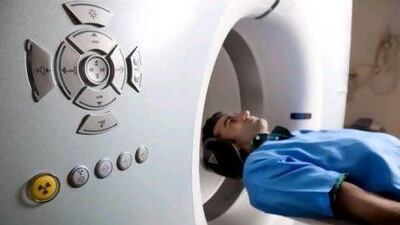In studies linked to the cancer information programme in the US, victims as young as 25 years old were presented as case study examples of how a disease thought to only affect adults in later life is causing increasing concern for medical authorities around the world.
"We're seeing a growing trend of more colorectal cancer patients under 50, some even under 40," explained Dr Scott Goldstein, the director of the Division of Colorectal Surgery at Thomas Jefferson University Hospital in Philadelphia, at a recent cancer awareness event.
The news reflects similar findings here in the UAE. With previous reports suggesting that colorectal cancers appear at a younger age in the Emirates, a team of specialists from the Sheikh Khalifa Medical Centre (SKMC) in Abu Dhabi undertook a recent study to confirm this - examining the age and stage of the disease at the point of diagnosis among those treated at SKMC.
More than 200 patient records were surveyed and led researchers to conclude that Emiratis with colorectal cancer do present at a relatively young age with advanced stages of the disease - indicating that the disease has struck the victims even earlier in life. They have suggested that a screening programme is warranted - and they're not alone. But in the UAE, like many nations, screening for bowel cancer isn't recommended until the age of 50. As a result, younger sufferers and their cases aren't caught early enough.
The US data suggests that while the disease is generally on the decline, the number of sufferers below the age of 50 has risen by two per cent per year over the past 20 years. UK cancer researchers have also recorded a worrying increase in the incidence of bowel cancer in the under 30s. The Australian Institute of Health and Welfare's (AIHW) cancer database reveals that diagnosis of bowel cancer, and deaths from the disease, are increasing more rapidly in younger people than other age groups.
"Younger people are also at higher risk of a more aggressive form of the disease and some have a genetic background, that predisposes them to a higher risk," says colorectal surgeon Graham Newstead of the AIHW.
Colon cancer is caused by the abnormal growth of cells in the lining of the bowel. Lumps called polyps can develop into cancerous tumours. Screening can detect polyps and they can be removed by a procedure called a colonoscopy - but because the majority of cases occur later in life, any concerns among those in the lower age bracket are often ignored. Awareness campaigns about the disease are also not targeted at them. Even when there are symptoms in young people, bowel cancer is often one of the last possible causes to be tested for. "But you should never be told you are too young to have bowel cancer," says Newstead.
Reasons for the higher incidence among Emiratis is often blamed on increased levels of dietary fat and meat consumption - but recent news from Canada also implicates infection as being a possible cause. Researchers led by the professor Robert Holt, from Simon Fraser University in Canada, found the bacteria fusobacterium in colon cancer tissue. Fusobacterium - which doesn't usually live in the gut - is a known cause of disease.
The findings, published in Genome Research, require further investigation but may lead to clinical trials that will examine the role antibiotics could play in treating this form of cancer. UK scientists are also examining what role stem cells in the bowel wall may play in the development of stomach cancers.
In the meantime, calls continue for a reassessment of the screening criteria to address the issue of younger people developing the cancer. In the UAE, Dr Emad Al Rahmani, the chairman of medicine at Mafraq Hospital, told the Abu Dhabi Medical Congress that screening could have a significant effect on the number of sufferers.
Dr Rahmani has been one of a number of health experts calling for all men and women age 45 - or 35, if there is a family history - to undergo screening, highlighting the fact that the relative incidence of the disease has almost doubled in the UAE in the past decade.
While some breakthrough has been made in screening programmes for men to detect prostate cancer - along with established observations for women such as breast and cervical cancer checks - there is, as yet, no national screening process in place for bowel cancer, despite it being the third most frequent cancer in men and the fourth among women.
Bowel cancer awareness campaigns around the globe are also highlighting preventive steps you can take to reduce your risk of becoming a victim. The chief advice is to make dietary changes - this follows research that says people who eat more vegetables and less red and processed meat have a lower risk, although the exact reasons for this aren't clear.
Last year, the European EPIC Cancer group of experts reviewed 25 separate studies that showed how people who ate the most fibre in their diet also had a 40 per cent lower risk of bowel cancer than those who ate the least amount of roughage.
A similar review of data suggested that vitamin E, the mineral selenium and calcium could play roles in preventing the growth of bowel polyps - though more damning evidence focuses on the link between obesity and colon cancer. Again the EPIC study group confirmed that being obese has a direct link with some types of cancer. Quite oddly, laboratory tests also show that curcumin, the substance found in the spice turmeric, may also combat the growth of cancer cells. Though whether this will work outside of the clinical confines of the research laboratory - say, when sprinkled on meals - remains to be proven.

